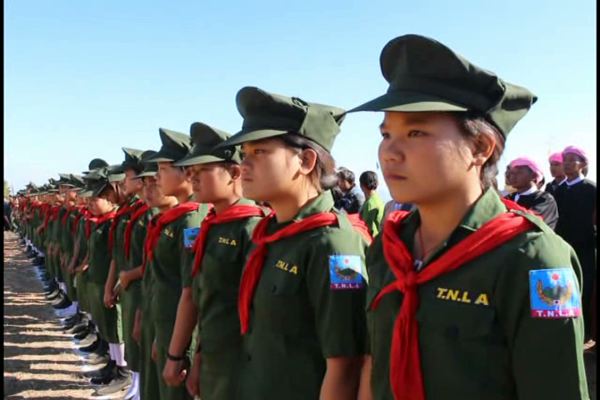As hundreds of delegates gather in Naypyidaw this week for a high-level peace summit, a spokesman for the Ta’ang National Liberation Army (TNLA) has said his people are ready to hold talks aimed at ending their ongoing conflict with the Restoration Council of Shan State (RCSS).
The focus of the 21st Century Panglong Conference is Burma’s decades-long bilateral conflicts pitting the Tatmadaw against several ethnic armed groups in their respective territories, but the TNLA and RCSS — both attending the conference — have been engaged in clashes that could be described as inter-ethnic minority. Populations of ethnic Ta’ang, or Palaung, and Shan cohabit in parts of northern Shan State, and the sporadic but simmering conflict has, for more than a year, strained any sense of ethnic unity in the face of the powerful Burma Army.
This week Mong Aik Kyaw, the TNLA’s chief information officer, said his side was prepared to come to the negotiating table to resolve the two sides’ differences, which appear largely to be concerned with territorial disputes.
“We are ready to have discussions about ending armed conflicts with the Restoration Council of Shan State in a place where we can be safe,” the TNLA spokesman said, while seeming to indicate that such talks would not take place on the sidelines of this week’s Panglong summit.
“We invited them [the RCSS] to have dialogues but they have avoided them. We are prepared to meet with them in China, Panghsang or Mongla,” he said, the latter two being autonomous enclaves in Shan State.
“However, the RCSS proposed meeting in Chiang Mai [Thailand]. Because we have not signed the Nationwide Ceasefire Agreement [NCA], we have security concerns over having the dialogues take place in Chiang Mai. If a place has been decided by mutual agreement, we are ready to meet with them.”
Khun Sai, managing director of the Pyidaungsu Institute and an adviser to the RCSS, said there were no plans to convene a dialogue between the two sides yet.
[related]
“I hope there will be in the future,” he added. “Assessing the situation, there is room for misunderstandings. If there would be discussions between the two parties, they could resolve those misunderstandings. This does not have to be a formal meeting. I reckon that conflicts will be resolved if we have informal discussions frequently.”
In parts of Shan State where there are sometimes overlapping territorial claims and mixed Shan and Palaung populations, meanwhile, locals have expressed concerned that the armed clashes had brought about suspicions among their communities — especially in villages where both Palaung and Shan people reside.
“The situation is getting tense in those villages where both Ta’ang and Shan people live. The locals have lost trust and grown suspicious of each other. Currently, it is stable here. Still, they lack trust in each other. Young Ta’ang men are mistaken to be Shan and the same goes for Shan. The situation could potentially get worse,” said Nor Hein, a local of Namhkam town.
Fighting between the TNLA and RCSS first flared in November 2015, with dozens of clashes reported since then. Most recently, hostilities between the two sides on 13 May caused about 200 locals to flee their homes, seeking refuge in the town of Kyaukme.



